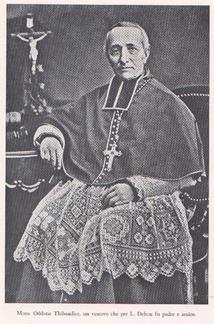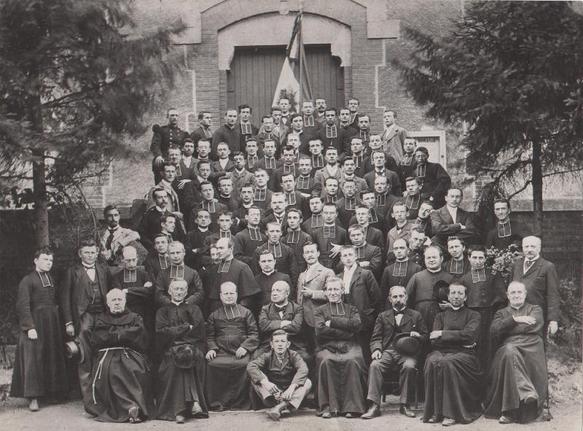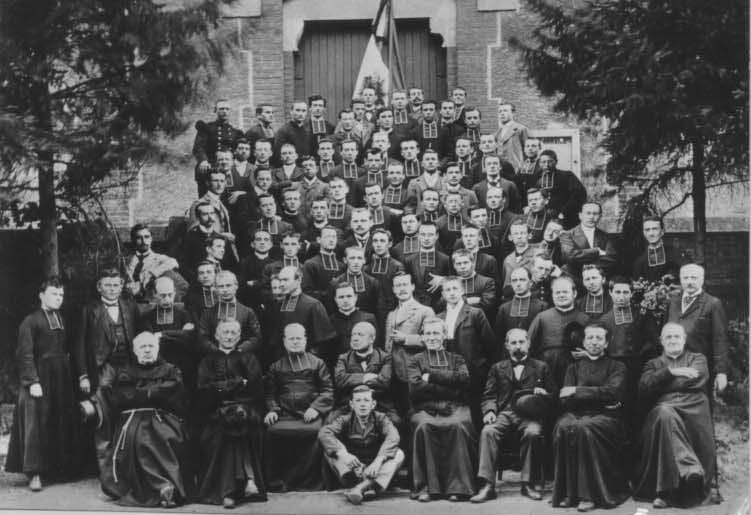the great question of our time, the social question, whose solution is dependent on faith, reason, revelation, and natural and Christian morality...
Fr. Dehon and “The Social Question” (Part 3)
 Bishop Thibaudier Bishop Thibaudier
In 1889, his superior, Bishop Thibaudier, told Fr. Dehon
that his young congregation would have to merge with a more established one,
and that he would have to leave St. John College. Dehon was devastated by this second
“Consummatum Est” (“It is finished”), delivered
by the same man who had approved this work.
The order to leave the college was rescinded two days later, and
attempts to find a congregation to merge with foundered. Then in 1890, a new diocesan shepherd, Bishop
Duval, arrived who was even less sympathetic to Fr. Dehon and his young
congregation. He pushed Fr. Dehon to
give up the running of St. John’s, and in 1893 Dehon reluctantly agreed. In the midst of all this, as well as internal conflicts in the congregation itself, he
remained obedient to God’s will, humbly offering his “Fiat!” (“Let it be
done!”) to whatever might come.
However, once freed from the direction of St. John’s and involvement in the St. Joseph Youth Club, Fr. Dehon was able to devote himself more fully to the social apostolate. His continued to honor Pope Leo XIII’s request to “preach my encyclicals” through his magazine “The Reign of the Sacred Heart in Souls and Society.” In a November 1892 article entitled “Democracy and the Sacred Heart,” Dehon reflected on the promise of “liberty, fraternity and equality” that had accompanied the French Revolution. While acknowledging “some generous measures” that helped the lower classes, he castigated the “explosion of hatred and folly; massacres, pillage, general ruin, the suppression of all charitable works and institutions, endless war and utter misery” that also followed in its wake. Noting that “some generous Catholics had believed that it was possible to reconcile the Gospel with socialism,” he reminded his readers that the pope’s encyclical had made clear the “fatal errors” of that doctrine. “The true solution,” he wrote, “lies in the practice of justice and charity. The rich person must not forget that he is only a trustee of his goods in the eyes of God and that he must give those whom he employs a fair share of the fruit of their labor,” as well as acting “in an affectionately paternal way towards them.” At the same time, he adds pragmatically: “Nothing prevents us from meeting with the socialists for a multitude of useful reforms for which they have, indeed, most often borrowed the first idea from us.” Despite his opposition to socialism, however, Fr. Dehon had evolved into a committed democrat, unlike most of his contemporaries in the French Church. He did not share the view of de Mun and many French bishops, called “Intransigents,” that the church must destroy the Revolution unless she wants to be destroyed by it. Instead, he adopted the view of Pope Leo, who while personally preferring the monarchy, wanted to seek an accord with the increasingly anti-Catholic French Republicans. The pope had previously asked de Mun to abandon his plans for a Catholic party in opposition to the Republicans, and had recently resisted the overtures of the Boulangerists.[1] In 1892, after many Republicans had begun to consider a more tolerant policy toward the church, Pope Leo had issued a letter stressing that the Church is not bound to any political regime and accepts legally constituted governments, whether monarchies or republics, in order to work together for the common good. Further, the duty of Catholic citizens is to work within the framework of the legal order to pass just laws and repeal unjust ones. Pope Leo stated things even more clearly in a letter to the French cardinals later that year: Anyone who regards political party, no matter how worthy its cause, as more important than the defense of religion, is promoting the politics of division and conflict rather than the politics of unity, which is in the best interest of religion as well as the common good. He urged France to follow the example of the United States. “There, freedom is truly the basis of the relationships between civil power and the religious conscience.” But while the majority of French Catholics, both lay and clergy, gradually came to accept the existence of the Republic, they never fully embraced the spirit of reconciliation and moderation at the heart of the pope’s directives. They found his policy of rapprochement hard to accept and failed to see that he was attempting to heal the breach between the Church and the new society which reflected a coming new world order. But neither his royalist leanings nor Republican persecution of the Church kept Fr. Dehon from openly supporting Leo XIII’s policy of rapprochement. In the July 1892 issue of his magazine, he had written: “Leo is clairvoyant when he declares that the future belongs to democracy.” In the January 1893 issue, he summarized the views of the Intransigents and the “friends” of the Pope’s policy, concluding that “both groups are acting in good faith and want the Church to win.” But “who is right? Undoubtedly the pope and those who follow him. We want to share the pope’s hopeful outlook.” In 1892, Bishop Duval convened a Commission for Social Studies in the diocese of Soissons. In June of 1893, after seeing his competence as a member in its first year, Duval offered Dehon the presidency of the commission, and Dehon accepted. The commission’s first task was the development of a manual of the principles of Catholic social doctrine, along with practical solutions to contemporary problems. A collaborative effort featuring contributions by La Tour du Pin and others, this “Christian Social Manual,” which was first published in August 1894, featured chapters by Fr. Dehon on Freemasonry and Judaism, and Socialism and Anarchy. He also wrote an appendix on the Circle Movement and most of Part II on practical solutions. The manual went through several further editions between 1895 and 1910, exposing tens of thousands to Catholic social teaching. In 1898, he published another major work, “The Social Catechism,” meant as a practical, popular text for priests in ministry.  Val-des-Bois Social Congress (Dehon seated front row second from left) Val-des-Bois Social Congress (Dehon seated front row second from left)
The last years of the 19th century saw Leo Dehon’s involvement in the social apostolate peak. After 18 years of slow growth, the social conferences that started at St. Sulpice and continued at Val-des-Bois needed to be moved to St. John’s College in St. Quentin. The first of these, in 1895, was a “veritable congress,” notes Manzoni, “with two hundred priests from over thirty dioceses.” The topics discussed included education of the clergy, social action by the clergy, Christian democracy, and (Dehon’s favorite) “modern usury.” He wrote in his diary that “These are memorable days – ardent, shining and unforgettable. It’s a mini council, a council made up of youth… this mini congress will be influential in the reawakening of Christian social life in France.”
In May 1896 Fr. Dehon took part in the 3rd Congress of Workers’ Study Circles, as one of 600 delegates, and immediately after that in the congress of the Circle Movement in Paris. In August of that year, he was a doctrinal expert at a congress of 700 priests in Reims, at which every social problem was discussed in light of Pope Leo’s encyclicals. In that same month and city, he attended the Congress of the Franciscan Third Order in that same city, giving a presentation on usury, banks, industry, commerce and the evil effects of poverty. In December, he left for a four month stay in Rome, where he gave five lectures on the social question organized by the Assumptionists. While there, he had another audience with Pope Leo (along with Harmel and two others), and on his way back to France, he made stops in Milan and Bergamo to learn about the social works of the Catholic movement. In August 1897, Dehon was in Nimes for the fourth congress of the Third Order, and after a discussion on the subject of wealth, he co-authored a pamphlet, “Wealth: Moderate Means or Poverty?” Using the Gospels and Rerum Novarum, they concluded that while voluntary poverty can be required for some who are specially called, the majority can only be asked to be good stewards of their wealth and not keep more than what is legitimate for their well-being. The following year the Third Order held an international congress in Rome with 15,000 participants. Despite Dehon’s and Harmel’s efforts, however, the congress explicitly stated that the Third Order is “not an organization to promote political economics.” This was a blow not only to them, but also to Leo XIII, who had wanted to see the Third Order focus on the social question. By 1897, Christian Democracy had reached its high-water mark, and in December of that year held its own congress in Lyons. But here too, Dehon and Harmel (who was a committee chair) were disappointed with a lack of follow-through, as enthusiasm was not matched by organizational commitment or financial resources, and rivalries and divisions undermined the movement. Dehon, like Harmel, eschewed all political involvement, but from 1897-1900 he couldn’t avoid it. The pope wanted to see Christian Democracy succeed, and Dehon’s good relationships with conservative Catholics, monarchists, and Rome made him an important bridge-builder between the groups. Despite his best efforts, though, in the general elections of 1898, right-wing and left-wing Catholics cancelled each other out, to the benefit of the radicals and Socialists. After six years of “détente” between Church and State, many religious had returned to their convents, colleges, and chapels, and Catholic works had flourished. All these results of the pope’s policy of rapprochement, however, would soon come to nothing. FOOTNOTES: [1] followers of the Minister of War, Gen. Boulanger, who had dreams of restoring the monarchy. |
